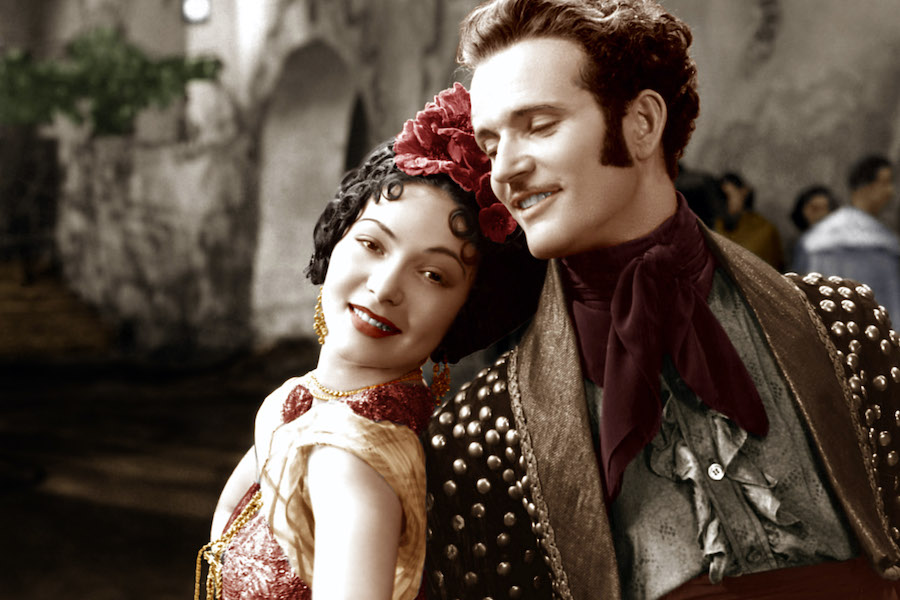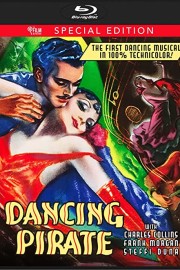Dancing Pirate (Blu-Ray Review)
**The Film Detective’s Special Edition release of “Dancing Pirate” is available on Tuesday, February 22, 2022. This review is not just about the film, but the disc itself.**
I think the moment that will always stick with me about 1936’s “Dancing Pirate” is how, the daughter of the mayor is excited to learn that the dance instructor who’s been mistaken for a pirate knows how to waltz, and then, when he wants to show her, she- and others- are taken aback to learn that it requires physical contact. I understand that the film takes place in 1820, but the idea that people are familiar with a form of dance, but not how it is performed, is fascinating to me.
The cover art for The Film Detective’s new special edition restoration for this, the first completely technicolor dancing musical, makes this seem more exciting than it really is. The film starts with our lead, dance instructor Jonathan Pride (Charles Collins), teaching students in Boston. We see him show off his moves, and it’s an impressive display. He is off to see relatives for the weekend when he gets set upon by pirates, whom recruit him, and he gets a trip to Spanish-occupied California. They arrive at a small seaside village, where he manages to escape, but the townspeople- including the mayor (Frank Morgan) and his daughter (Steffi Duna)- mistake him for a pirate, all the same. He is marked for death, but not until he teaches the daughter to waltz. That’s basically all to the story.
When you name a film “Dancing Pirate,” you are shooting your shot when it comes to tone. This isn’t going to be a serious swashbuckler, but a jovial, fun movie with music and probably some humor. Collins is fine enough as the lead, and Morgan and Duna have their moments as well, but nothing they do raises this beyond the level of an early attempt at marrying music and choreography on-screen, and giving it a colorful look for audiences. Save for the moment I mentioned at the beginning, I cannot imagine myself taking anything else from this film. This historical place for this is as the first musical in color, and while the dancing- which was Oscar nominated- is good, this is a nothing more than a good look at how films, even four decades in, were still finding their way as an art form. This isn’t one of the classics, but I get why The Film Detective decided it was worth preserving- “Dancing Pirate” is a film doing some things differently from how musical filmmakers did before, but also keeping to a level of silliness left over from the silent era, before sensibilities and tones became more refined. For that reason, I’m grateful for having seen it.

Blu-Ray Presentation
If you’ve been following my journey through The Film Detective Special Editions, you pretty much know what to expect. I’m really grateful to have access to them for review because, even if the movies are not always good, they give me a glimpse of movies on the edges of the medium, that don’t have the reputations of others, but show a throughline in the evolution of the art form. “Dancing Pirate” is just that, and this film looks and sounds wonderful in its new restoration. The image has depth, and the colors look as natural as they could in 1936, and the soundtrack is crisp and solid.
I appreciate that, in the extras presented, the commentators are not making it seem as though “Dancing Pirate” is some forgotten classic in the musical genre. When the video essay, “Ambushed by Mediocrity: Remembering the Dancing Pirate,” begins, film historian Michael Schlesinger is upfront in saying how this isn’t among the greats of its genre, and he talks about how stars were not in the cards for this musical comedy, while also giving us an idea of why the film matters. The film’s use of technicolor is central to why it is important in movie history, and we get an interesting look at the early history of the color process in “Glorious Pioneers: The Birth of Technicolor” by David Pierce. Context is what The Film Detective does best, but there is genuine affection in the words of Jennifer Churchill about the film, whether it’s her audio commentary for the film, or the written essay where she discusses the career of star Charles Collins.
Film Grade: C+
Audio & Video: A-
Special Features: A
“Dancing Pirate” is one of those movies where, maybe I’ll never watch it again, but that I had the chance to watch it at all is a blessing. This is where The Film Detective matters; they don’t want films like this to be forgotten. No film, even mediocre ones, deserves that fate.










